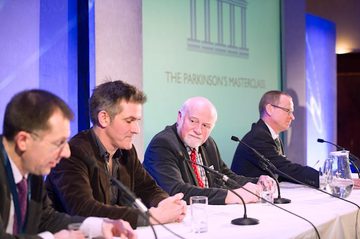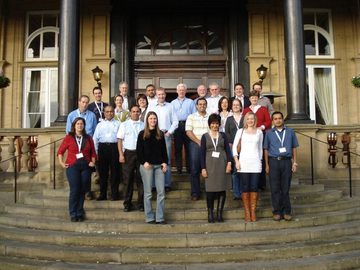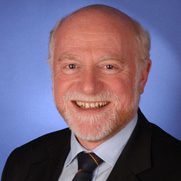Founding faculty – Dr Doug MacMahon: Proud to have enabled better outcomes for people with Parkinson’s
NewsDr Doug McMahon
Faculty director, retired
For Dr Doug MacMahon, the driver to seeing change has always been to see better outcomes for people with Parkinson’s. As a geriatrician in Cornwall, he saw problems within his own service and set about improving them.
‘I’d worked in diabetes and they had specialist nurses. Parkinson’s is just as complex and yet there was nowhere near the same support available.’
Doug set about creating a specification and trialled the first ever specialist nurse post in his service. Seeing how it changed the quality of care for his patients, he set about sharing his work. There are now over 300 specialist nurses across the country, essential members of the specialist teams who support people with Parkinson’s.

Dr Doug MacMahon at a MasterClass 2014
Developing the Parkinson’s MasterClass alongside fellow experts David Stewart, Peter Fletcher, John Hindle and Sue Thomas was essentially this same approach but across the full spectrum of clinical expertise, service delivery and patient care. ‘We were all finding the same problems, the same patchy services, and all trying to do something about it,’ he says. The group initially envisaged that by running one or two educational courses, they could upskill professionals and equip them to improve the quality of care in their area, thus driving up quality and equity of provision across the UK.
‘We thought – perhaps naively! – that there would just be one or two courses run, but it’s been a continuous process – it really demonstrates how there is always more to learn, and better standards to aspire to in care.’
There have been vast improvements in the care available for people with Parkinson’s over the past decade or so - the same timespan as the MasterClass has been running. Doug specifically notes improvements in diagnosis, drug management, palliative care and multidisciplinary support. Additionally, things like non-motor symptoms, which were not recognised in their own right until the 1990’s, are now recognised as a vital and essential part of Parkinson’s itself. Medicines management is not only vastly improved, it is expertly managed through new tools and strategies implemented by the people who have, in turn, been upskilled through improved education and mentorship - both integral to the Masterclass programme.

Parkinson's MasterClass 12.2 in Harrogate, 2008
‘The MasterClass is central to getting people to have a clear and quality approach to meeting the needs of people with Parkinson’s,’ Doug says, although for him, it is hard to separate out the benefits of the MasterClass from the overarching ‘revolution of care’ which co-founder David Stewart also speaks of.
Having not only founded the MasterClass but also created the first Parkinson’s Specialist Nurse post and then been instrumental in setting up the Parkinson’s Excellence Network alongside national charity Parkinson’s UK, he sees his role as having generated a number of means to the same end. ‘All of these elements come together to achieve the same objective: better care and better outcomes for people living with Parkinson’s’, he says simply. Whilst there is always more to learn and more to improve on, this objective has clearly and consistently driven his work and benefitted the lives of thousands of people living with Parkinson’s.
Related articles
'The things you can't get from the books'
Parkinson's Academy, our original and longest running Academy, houses 23 years of inspirational projects, resources, and evidence for improving outcomes for people with Parkinson's. The Academy has a truly collegiate feel and prides itself on delivering 'the things you can't get from books' - a practical learning model which inspires all Neurology Academy courses.



